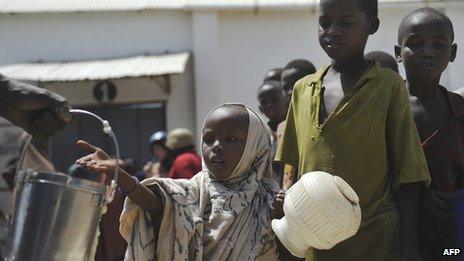Somalia famine 'killed 260,000 people'
- Published

Nearly 260,000 people died during the famine that hit Somalia from 2010 to 2012, a study shows.
Half of them were children under the age of five, says the report by the UN and the US-funded Famine Early Warning Systems Network (Fews Net).
The UN Food and Agriculture Organisation (FAO) said humanitarian aid needed to be provided more quickly.
The crisis was caused by a severe drought, worsened by conflict between rival groups fighting for power.
The number of deaths was higher than the estimated 220,000 people who died during the 1992 famine.
Western aid group ban
Rudi Van Aaken, the deputy head of the FAO operation for Somalia, told the BBC that the response had been too slow.
"I think the main lesson learned is that the humanitarian community should be ready to take early action - respond early on."
"Responding only when the famine is declared is very very ineffective. Actually about half of the casualties were there before the famine was already declared."
The FAO said earlier that the "true enormity of this human tragedy" had emerged for the first time from the study, done jointly with Fews Net.
"By nature, estimating mortality in emergencies is an imprecise science, but given the quantity and quality of data that were available, we are confident in the strength of the study," said Fews Net official Chris Hillbruner.
"It suggests that what occurred in Somalia was one of the worst famines in the last 25 years," he added.
The UN first declared a famine in July 2011 in Somalia's Southern Bakool and Lower Shabelle regions. They were controlled by the militant Islamist group al-Shabab, which is aligned to al-Qaeda.
Al-Shabab denied there was a famine and banned several Western aid agencies from operating on territory under its control.
The famine later spread to other areas, including Middle Shabelle, Afgoye, and at camps for displaced people in the government-controlled capital, Mogadishu.
An estimated 4.6% of the total population and 10% of children under five died in southern and central Somalia, the report says.
In Lower Shabelle, 18% of children under five died and in Mogadishu 17%, the report said.
Continuing child malnutrition
Somalia was worst hit by the extreme drought in 2011 that affected more than 13 million people across the Horn of Africa.
Tens of thousands of people fled their homes in search of food.
The UN declared the famine over in February 2012.
"While conditions in Somalia have improved in recent months, the country still has one of the highest rates of child malnutrition and infant mortality in the world," Ben Foot, from the charity Save the Children, said in a statement.
The UK government has said that at a conference it is hosting on Somalia's future next week it will set out policies on how to tackle the root cause of famine and contain the effects of drought.
The UK's International Development Secretary Justine Greening said Somalia's famine had been "one of the worst disasters of recent times,"
During more than 20 years of civil war, Somalia has seen clan-based warlords, rival politicians and Islamist militants battle for control - a situation that has allowed lawlessness to flourish.
Last September, a UN-backed government came to power, after eight years of transitional rule, bringing some stability to some areas.